Key takeaways:
- Justice and mercy can coexist, promoting rehabilitation and opportunities for redemption rather than solely focusing on punishment.
- The death penalty raises ethical concerns due to the risk of wrongful executions, lack of crime deterrence, and financial burdens, suggesting a need for more effective methods like rehabilitation.
- True justice requires empathy, addressing socio-economic disparities, and recognizing that accountability can be coupled with compassion.
- Forgiveness can be a powerful act that fosters healing and transforms both victims and offenders, challenging traditional notions of justice.
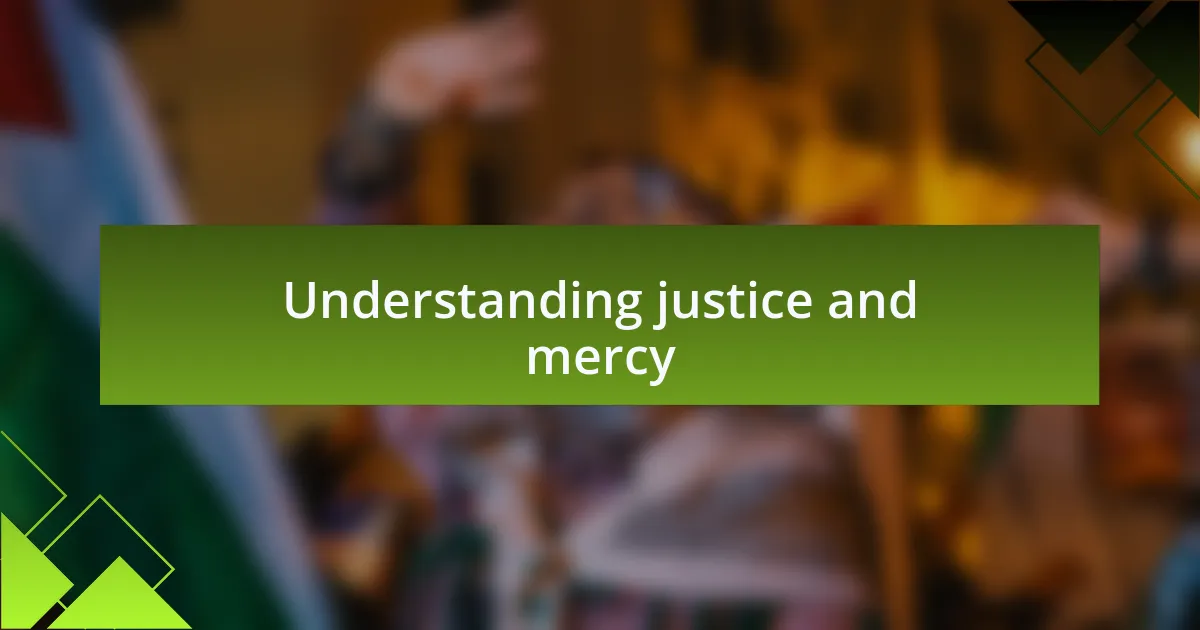
Understanding justice and mercy
Justice and mercy often appear as opposing forces, yet they can coexist in profound ways. I remember a case that deeply impacted me where a judge chose to show mercy towards a young offender. Instead of a harsh sentence, the judge facilitated community service and counseling, which transformed this young person’s life. This experience made me realize how justice can be served not just through punishment but through opportunities for redemption.
When I think about justice, I often wonder, is it simply about punishment, or is it about restoring balance in society? In my view, true justice encompasses understanding the root causes of a person’s actions. For instance, support systems and rehabilitation efforts can lead to a more just society. This doesn’t dismiss accountability; instead, it emphasizes that every individual is capable of change, highlighting the crucial role mercy plays in the justice system.
Mercy, on the other hand, can sometimes feel like a hard sell in a world that prioritizes retribution. I once engaged in a debate where someone posed the question: “Why should we show mercy to those who have harmed others?” This question troubled me initially, but then I shared my belief that showing mercy often reflects our own humanity. When we offer mercy, we not only support the possibility of change for the offender but also comfort the victims, creating a culture that values healing over hatred.

Arguments against the death penalty
One of the most compelling arguments against the death penalty is the risk of wrongful execution. I once spoke with a legal expert who recounted several cases where new evidence had exonerated individuals on death row. Imagine the devastating reality of realizing that an innocent person was sentenced to death, their life extinguished due to a flawed system. This possibility alone raises significant ethical concerns and highlights the irreversible nature of capital punishment.
Additionally, the death penalty doesn’t effectively deter crime. During a discussion with a friend who used to work in law enforcement, we explored the statistics showing that states with the death penalty don’t have lower crime rates compared to those without it. This made me reflect: if the primary goal is to prevent future crimes, shouldn’t we focus on proven methods like education and rehabilitation instead?
Lastly, the financial burden of the death penalty compared to life imprisonment is staggering. In an engaging conversation with a local activist, we discovered that the lengthy appeals process and necessary legal resources often cost taxpayers significantly more. Why invest in a system that doesn’t deliver justice efficiently? I think it’s crucial to consider not just the moral implications but the practicalities, as society can utilize resources more effectively for rehabilitation and support.
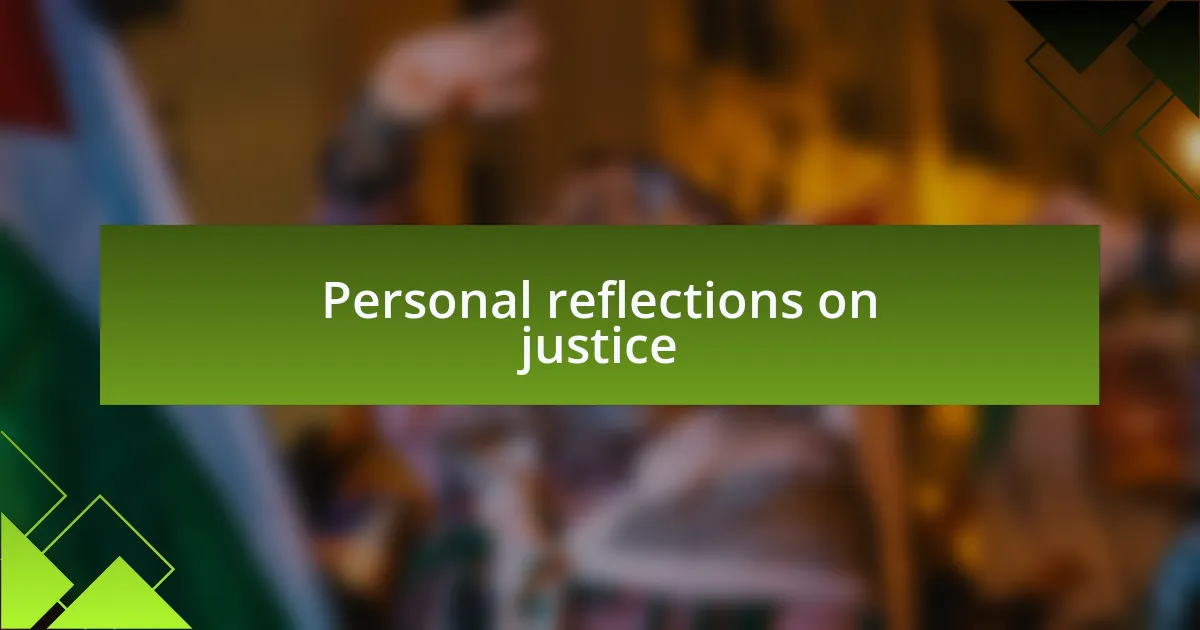
Personal reflections on justice
Justice, to me, embodies a delicate balance between accountability and compassion. I remember a time when I volunteered at a community organization that worked with former offenders. Hearing their stories made me realize that our system often punishes without offering a genuine opportunity for redemption. Isn’t it worth asking if true justice allows for growth and change, rather than mere retribution?
In my reflections, I often grapple with the notion of fairness. I recall a conversation with a mentor who shared her experiences working in the judicial system. She emphasized that the scales of justice can be tipped by socio-economic factors, leading to disparities in how individuals are treated. How can we claim to be just when the system appears to favor those with resources over the most vulnerable among us?
Ultimately, I believe that justice must also embrace empathy. One evening, after a community forum on restorative justice, I felt a profound shift in my understanding. I saw how powerful it can be to listen to the voices of victims, offenders, and their families. Doesn’t justice demand that we not only seek to punish but also to heal?
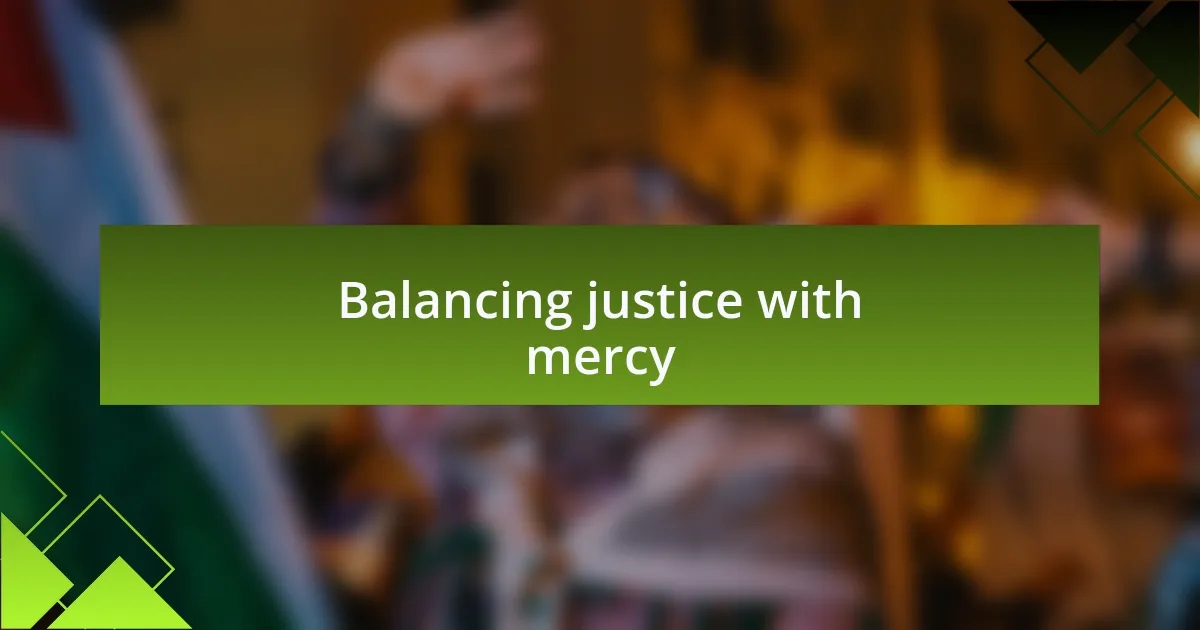
Balancing justice with mercy
Balancing justice with mercy can sometimes feel like walking a tightrope. I once attended a sentencing hearing where a mother spoke about her son’s life choices and their impact on her family. Her grief was palpable, yet she expressed a longing for understanding and forgiveness rather than pure punishment. How can we reconcile the need for accountability with the innate human desire for mercy?
I often find myself reflecting on the stories of individuals caught in the web of our justice system. There was a young man I met who had made mistakes in his past but was working tirelessly to turn his life around. Hearing his determination sparked a thought: should we not consider the possibility of rehabilitation as an essential part of justice rather than merely focusing on what he did wrong? This makes me wonder—can true justice exist if we ignore the mercy that allows for transformation?
In my view, mercy shouldn’t be seen as a weakness but rather as an essential component of a just society. During a workshop on criminal reform, I learned about the concept of restorative justice, which prioritizes healing over punishment. Engaging in that dialogue opened my eyes to the need for systems that prioritize second chances. Isn’t it the very essence of humanity to strive for a balance where justice serves as a pathway to redemption, rather than an obstacle to it?
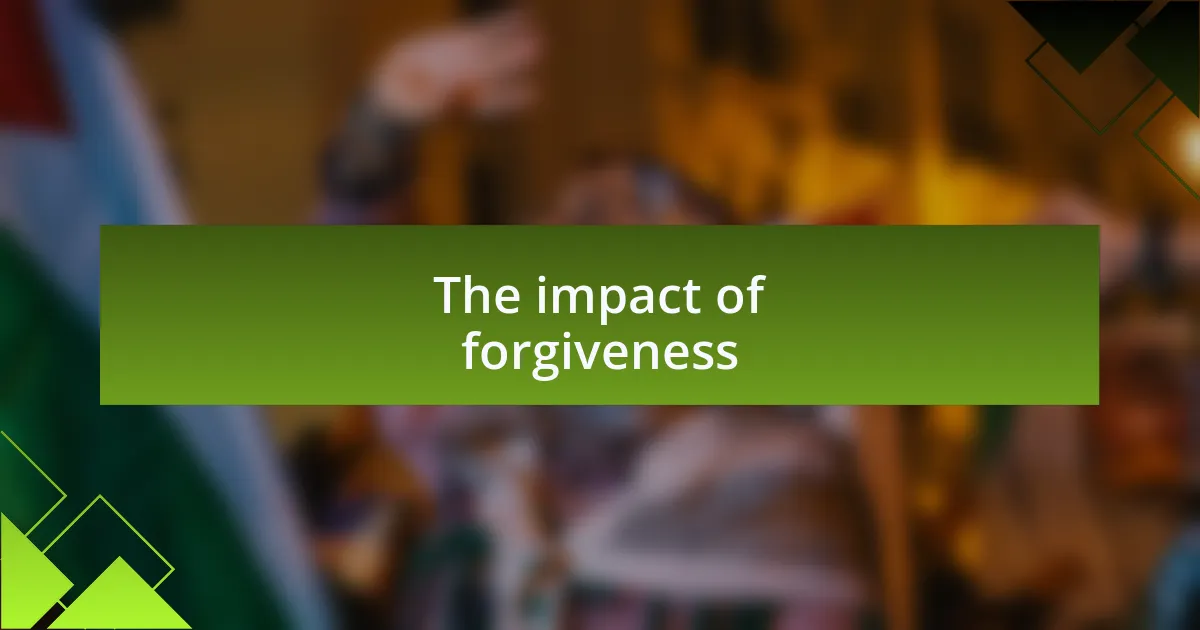
The impact of forgiveness
Forgiveness can often feel like a radical act in the face of deep harm. I still remember a powerful moment at a support group where a survivor shared how forgiving her assailant allowed her to reclaim her life. It was as if she lifted a weight that had been crushing her spirit. This makes me think: can forgiveness, in its complexity, be a key to unlocking healing not just for the victim, but for the wrongdoer too?
When I reflect on the transformative power of forgiveness, I see it as a bridge between despair and hope. I once spoke with a reformed offender who credited his path to redemption to the forgiveness he received from his victims’ families. Their willingness to forgive didn’t just impact him; it ignited a profound desire to give back to the community. How often do we overlook the ripple effects that one act of mercy can have on numerous lives?
It’s fascinating to consider how forgiveness can shift our collective understanding of justice. In my own journey, I’ve struggled with forgiving those who have wronged me, but I’ve discovered that forgiveness doesn’t mean forgetting or condoning the harm done. Instead, it’s about breaking free from the chains of anger and resentment. Isn’t it intriguing how the act of forgiveness can create space for true justice to emerge, allowing us to foster a sense of community rather than division?
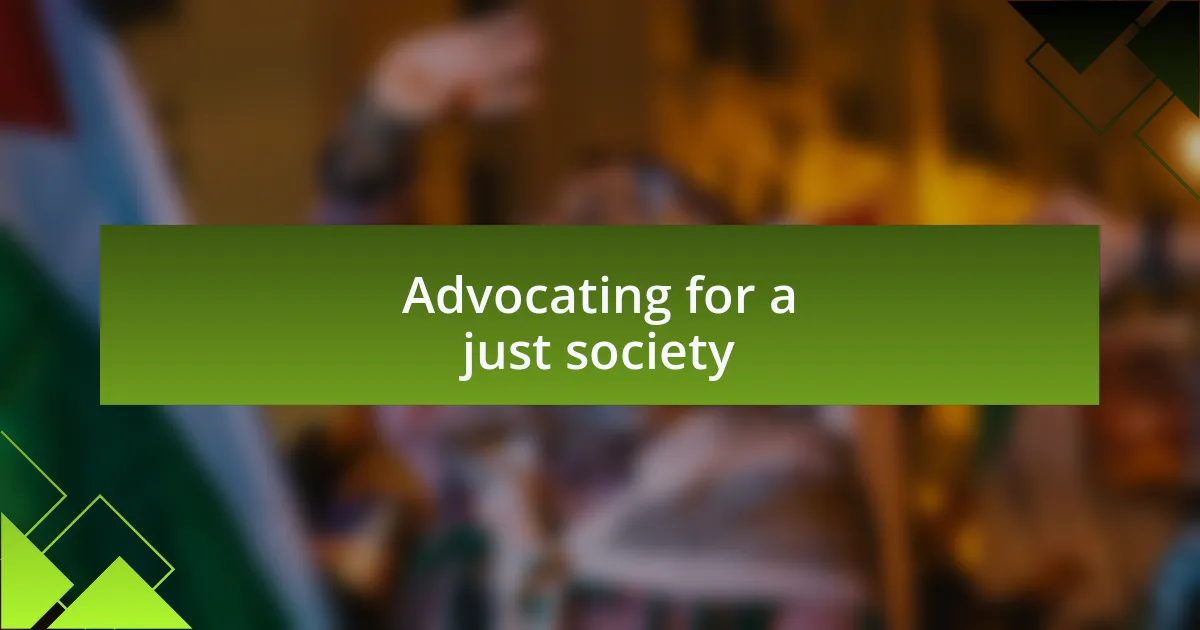
Advocating for a just society
Advocating for a just society requires us to challenge the status quo and envision a community that values equity over retaliation. I once attended a town hall meeting where community members passionately debated the justice system. Witnessing different perspectives reminded me that justice is not just about punishment; it’s about creating a society where everyone feels safe, supported, and valued.
I often think about the role of empathy in achieving true justice. During a discussion with a local activist, we pondered why many people seem to view justice as a zero-sum game. Why must one person’s suffering lead to another’s punishment? I believe that by fostering understanding and compassion, we pave the way for restorative justice, where healing and reconstruction take precedence over retribution.
Each of us has a responsibility to advocate for justice that transcends mere legality. I recall engaging with a former judge who shared how he fought for alternatives to incarceration. His experiences highlighted that a just society goes beyond criminal sentences; it actively seeks to address systemic issues that lead to crime. Shouldn’t we all ask ourselves how we can contribute to a societal framework that prioritizes human dignity and restorative practices?